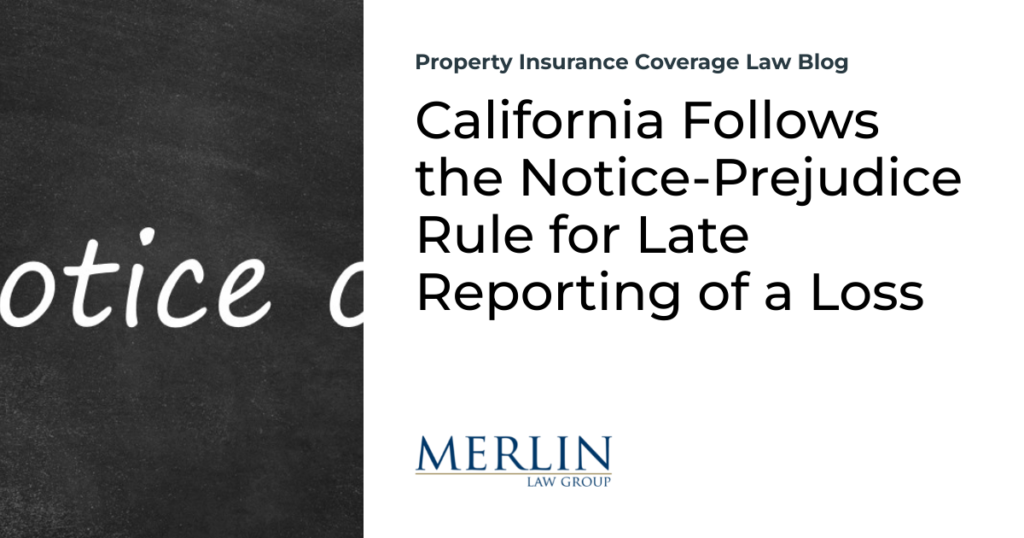California Follows the Notice-Prejudice Rule for Late Reporting of a Loss

In a recent unpublished opinion,1 the Federal Ninth Circuit Court of Appeals ruled that California upholds the late notice prejudice rule, where an insurer does not have to pay if the insured reports a loss late and the insurer proves it was prejudiced by the late reporting.
Here is the holding:
If an insurer fails to object promptly and specifically to a delay in the presentation of notice, any objections based on delay are waived. Cal. Ins. Code § 554. The purpose of section 554 is to prevent an insurer from ‘lulling the insured into believing that notice and proof of loss are unnecessary.’…If untimely notice is raised concurrently with other grounds for denial, it is preserved as a defense….
We are satisfied that West American specifically objected to Stockton’s delayed notice. The Reservation of Rights letter stated that West American was investigating the loss under a reservation of rights and alerted Stockton to the relevant provisions related to the investigation, including the Vacancy Clause and Stockton’s duty to provide prompt notice of the loss. The denial letter also made clear that late notice was the reason for denial. In short, the harm that section 554 is intended to avoid—the insurer’s misleading the insured into inaction—is not present here.
… Finally, under California’s notice prejudice rule, an insurance company may not deny an insured’s claim under an occurrence policy based on lack of timely notice or proof of claim unless it can show actual prejudice from the delay. The burden of establishing prejudice is on the insurance company…and prejudice is not presumed by delay alone…Although the issue of prejudice with respect to delay is one of fact, under some circumstances, prejudice can exist as a matter of law. Nw. Title Sec. Co. v. Flack, 85 Cal. Rptr. 693, 697 (Ct. App. 1970).
Here, West American has shown that it suffered actual prejudice because of Stockton’s delay. West American’s ability to investigate was not only impaired but rendered impossible. Given the delay, an investigation would not be able to determine whether an appreciable loss was covered under the policy. See 1231 Euclid Homeowners Ass’n v. State Farm Fire & Cas. Co., 37 Cal. Rptr. 3d 795, 804 (Ct. App. 2006) (holding that the insured’s failure to provide timely notice prejudiced the insurer because it ‘effectively denied [the insurer] any opportunity to fully investigate the loss’). In other words, because of the delayed notice and the circumstances of loss in this case in connection with the Vacancy Clause, ‘it virtually becomes impossible to learn what facts, favorable to defendant, could have been ascertained through prompt inquiry.’ Purefoy v. Pac. Auto. Indem. Exch., 53 P.2d 155, 159 (Cal. 1935). Stockton’s late notice of its claim actually prejudiced West American as a matter of law.
The lesson learned and rule to be followed is—report losses as soon as you find or learn of them. Delay after learning of the loss invites insurers to investigate how they were prejudiced as much as what the value of the loss is, which could be paid.
Thought For The Day
You cannot do a kindness too soon, for you never know how soon it will be too late.
—Ralph Waldo Emerson
1 Stockton Mariposa v. West American Ins. Co., No. 22-55343, 2023 WL 3994971 (9th Cir. June 14, 2023).







